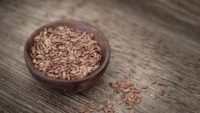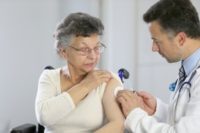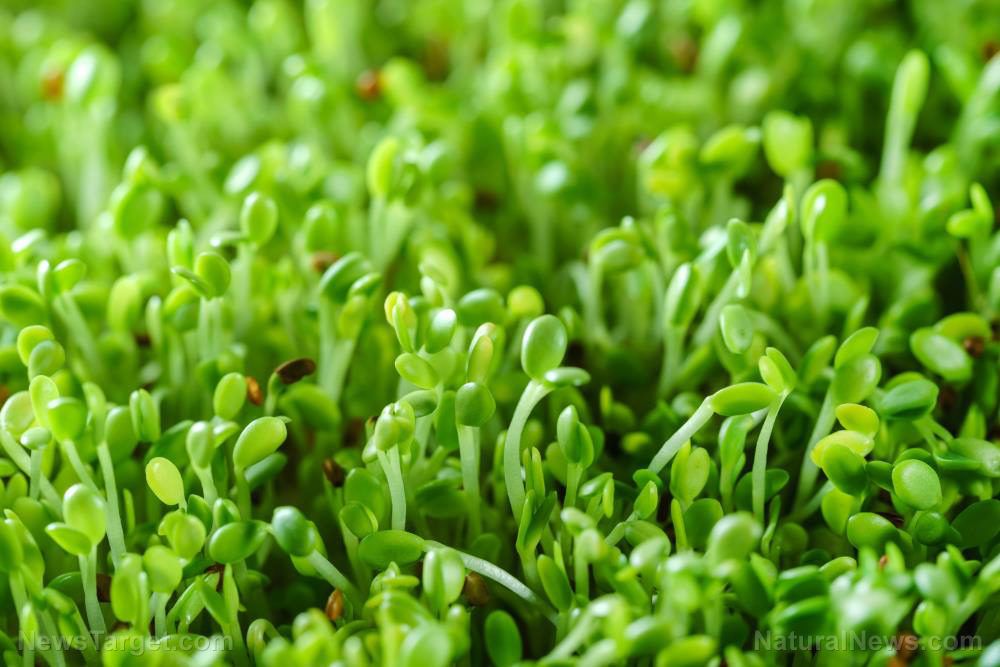By Chloe Morgan Have you ever gone to the mailbox the week after Christmas and discovered a fist full of bills? Have you thought back about the things your gift recipients enjoyed or … Read the rest The post Coal or. Goals: Quick Tips for Sticking to Your Christmas Budget appeared first on The Organic Prepper. …read more Source: Organic Prepper
By Darnel Fernandez (Natural News) The link between certain diets …read more Source: Natural News
By Jeff Contrary to popular belief, cartilage in human joints can repair itself through a process similar to that used by creatures such as salamanders and zebrafish to regenerate limbs, researchers at Duke… …read more Source: Natural Blaze
By Dr. Mercola During an acute stress response, your body undergoes chemical changes that enable you to run from predators or take down prey. It’s known as the flight-or-fight response. Unfortunately, some of those same life-saving chemical reactions used to protect you from danger may also be triggered as a coping response to perceived societal dangers, like dealing with a problem with a coworker or addressing the fear of public speaking. In other words, there are times your body finds it difficult to turn off the stress response. This chronic stress is one of the biggest challenges faced by U.S. [More]
By none Table of Contents What Is Cinnamon Tea? 5 Health Benefits of Cinnamon Tea How to Make Cinnamon Tea Cinnamon Tea Recipes Cinnamon Tea Side Effects Frequently Asked Questions About Cinnamon Tea Making cinnamon tea is a rather simple process — All you need to do is take a cinnamon stick (or two) and then boil it in water for a few minutes, and you’ll have a spicy beverage that may have antimicrobial, antioxidant and anti-inflammatory effects,1 to name just a few of its benefits. Learn how a cup of cinnamon tea may help boost your health by …read [More]
The number of over-65s taking anti-depressants has doubled in two decades, amid warnings the elderly are being given pills they don’t need. Charities have called the rise “alarming”, and raised concerns that pills are frequently “doled out” when other “extremely effective” treatments are not being offered. The increase is even more prominent among care home residents, with the number taking the medication four times higher over the period. …read more Source: Sott health news feed
By Sandra D. Lane By Sandra D. Lane According to Food Safety.gov, two of the most common foodborne illnesses are Listeria and E.coli. Dagny Taggart has already written an especially informative article … Read the rest The post Everything You Need to Know About E. Coli appeared first on The Organic Prepper. …read more Source: Organic Prepper
By Sandra D. Lane By Sandra D. Lane Anybody remember that song “Everybody’s Free (To Wear Sunscreen)” by Baz Luhrmann? I remember hearing that on the radio when the kids were in … Read the rest The post How to Protect Your Skin from Sun Damage appeared first on The Organic Prepper. …read more Source: Organic Prepper
By AdminM by Brian ShilhavyEditor, Health Impact News Coconut oil is nature’s richest source of lauric acid, long known to be a powerful antimicrobial. As a saturated fat, coconut oil is almost 50% lauric acid. Nature’s next most abundant source of lauric acid, human breast milk, comes in a distant second. For years now, research (primarily outside of the U.S.) on coconut oil has focused on the use of lauric acid as an adjunct or replacement for antibiotic drugs that have lost their effectiveness due to the emergence of antibiotic-resistant pathogens. 2019 has seen more studies published where …read more [More]
Is it bad to whiten your teeth? As it turns out, reaching for those over-the-counter whitening strips could actually be damaging your teeth in unexpected ways. Emerging research released in 2019 suggests teeth whitening dangers now include damaging the tooth layer known as the dentin, a protein-rich area that binds the roots to the gum. While much of the focus on tooth damage from tooth whitening products involves the outermost part of the tooth — the enamel — the latest wave of research looked at how whitening strips impact that protein-rich space underneath the enamel. This dentin layer consists mostly [More]
Nearly one in three Americans said dining out was this year’s top budget buster for them, followed closely by spending on groceries. Fast food and takeout are anathema to the ‘clean eating’ lifestyle trend that has swept the US – and much of the developed world – over the past 10 years. But while spending on gym memberships and boutique fitness classes has risen significantly over the past ten years, recent studies show that over-spending on takeout was the biggest financial mistake made by younger Americans in 2018, according to a MarketWatch report that cited data from a recent study [More]
There has never been a time in our history when more Americans have been on drugs. According to the most recent government numbers, 24.6 million Americans have used an illegal drug within the last 30 days. Of course the number of Americans taking legal drugs is actually far, far higher. According to Bloomberg, 46 percent of all Americans have taken at least one legal pharmaceutical drug within the last 30 days. In most instances, those legal drugs have been prescribed by doctors with the intention of helping people, but sometimes legal drugs are even more addictive than illegal [More]
By Daisy Luther By Daisy Luther These days, it’s increasingly common to have a chronic illness or disability, but that doesn’t mean that you can’t be prepared. We live in a toxic society … Read the rest The post 10 Tips for Preppers with a Chronic Illness or Disability appeared first on The Organic Prepper. …read more Source: Organic Prepper
European clinical guidelines on how to treat a major form of heart disease are under review following a BBC Newsnight investigation. Europe’s professional body for heart surgeons has withdrawn support for the guidelines, saying it was “a matter of serious concern” that some patients may have had the wrong advice. Guidelines recommended both stents and heart surgery for low-risk patients. …read more Source: Sott health news feed
By Michael By John Vibes A new study from the National University of Singapore (NUS) has suggested that having a diet that consists of a lot of mushrooms could significantly reduce your chances of losing brain… …read more Source: Natural Blaze
By Michael Greger M.D. FACLM A cup a day of beans, chickpeas, or lentils for three months may slow resting heart rate as much as exercising for 250 hours on a treadmill. …read more Source: nutritionfacts.org
Whether you’re an athlete looking to improve your training and performance, or someone trying to reduce pain and achieve better alignment, myofascial release therapy can likely help. This type of manipulative therapy targets hard knots and trigger points in the muscle tissue that can elicit tenderness, pain, stiffness and even twitching. While it’s still considered an “alternative treatment,” one that has been studied significantly less than similar approaches, there’s evidence that it may be beneficial for those dealing with pain or inflexibility even after trying surgery, medication and stretching. What Is Myofascial Release? Myofascial release (or MFR) is a type [More]
By Michael By Alanna Ketler The Facts: Many commonly prescribed medications have been found to have a drastic affect on the “good bacteria” in our gut. Reflect On: It is important to be aware of all… …read more Source: Natural Blaze
By Michael Greger M.D. FACLM Elevated levels of pro-inflammatory, aging-associated oxylipins can be normalized by eating ground flax seed. …read more Source: nutritionfacts.org
By AdminM by Brian ShilhavyEditor, Health Impact News Earlier this year, an epidemiologist who has published over 30 articles in medical journals approached me with concerns about soaring death rates among seniors due to influenza. This scientist was concerned because a correlation was seen between the FDA approval of the Fluzone High-Dose flu vaccine for the elderly in 2009, and annual deaths recorded among seniors due to the flu. Knowing that his research cast a negative light on the high-dose flu vaccine for seniors, he knew that mainstream media sources would never publish his research, …read more Source: Health Impact [More]
A leading medical journal is launching a global campaign to separate medicine from big pharma, linking industry influence to the pelvic mesh scandal that injured hundreds of women. The BMJ says doctors are being unduly influenced by industry-sponsored education events and industry-funded trials for major drugs. Those trials cannot be trusted, the journal’s editor and a team of global healthcare leaders write in a scathing editorial published on Wednesday. The “endemic financial entanglement with industry is distorting the production and use of healthcare evidence, causing harm to individuals and waste for health systems”, they write. …read more Source: Sott health [More]
By Graywolf by Graywolf Most of the information I’ve seen out there about preparing for a disaster is written for an individual, or sometimes maybe a small team of adults. The reality … Read the rest The post Teach Your Children Prepping and Survival Skills (In a Way They’ll Love It!) appeared first on The Organic Prepper. …read more Source: Organic Prepper
By Thomas Perry Source: Research Suggests We Can Heal With Vibration, Frequency, and Sound For more content like this visit REALfarmacy.com. By Arjun Walia Cymatics is a very interesting topic. It illustrates how sound frequencies move through a particular medium such as water, air, or sand and as a result directly alter physical matter. There are a number of pictures all over the internet as well as youtube videos that demonstrate how matter (particles) adjust to […] Source: Research Suggests We Can Heal With Vibration, Frequency, and Sound Learn more at REALfarmacy.com. …read more Source: realfarmacy.com
The NHS is “over-diagnosing” children having medical treatment for gender dysphoria, with psychologists unable to properly assess patients over fears they will be branded “transphobic”, former staff have warned. Thirty five psychologists have resigned from the children’s gender-identity service in London in the last three years, Sky News research suggests. Six of those have now raised concerns about hormone treatment being given to children with gender dysphoria, a condition where a person experiences distress due to a mismatch between their biological sex and their gender identity. …read more Source: Sott health news feed
By Michael By Alanna Ketler The Facts: Numerous studies show the scientific benefits of reading. These benefits tend to increase when reading from actual books rather than screens. Reflect On: Do screens… …read more Source: Natural Blaze
By Arsenio Toledo (Natural News) Feeding the body with nutrients …read more Source: Natural News
The Wayne State University School of Medicine recently hosted its first mandated plant-based nutrition instruction for 300 first-year medical students. Created in conjunction with the school’s medical student-led plant-based advocacy group, the Plant Based Nutrition Group (PBNG), the month-long curriculum consisted of videos, lectures, and multiple-choice quizzes relating to evidence-based science behind a whole-foods plant-based diet and how to integrate the nutrition knowledge into clinical practice. Students received comprehensive educational materials created by both PBNG and medical group Physicians Committee for Responsible Medicine detailing the connection between their basic science curriculum and plant-based nutrition. …read more Source: Sott health news [More]



















![Amazing Grace [Live] Amazing Grace [Live]](http://img.youtube.com/vi/i7-o73Msox4/0.jpg)










